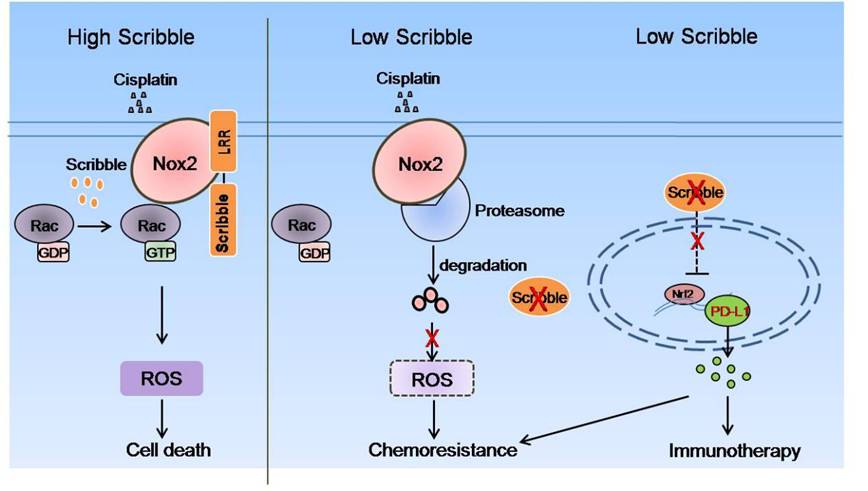Loss of Scribble Confers Cisplatin Resistance During NSCLC Chemotherapy via Nox2/ROS and Nrf2/PD-L1 Signaling
Recently Chinese researchers from Shanghai Institute of Nutrition and Health (SINH), of Chinese Academy of Sciences and Zhongshan Hospital (Shanghai) uncovered that Scribble is critical to the efficacy of cisplatin-based chemotherapy, an effect mediated by LRR domain-dependent protection of Nox2 from degradation, thereby promoting Nox2/Ros signaling. Interestingly, Scribble is responsible for elevated Nrf2/PD-L1 expression, which may separately contribute to cisplatin resistance in non-small cell lung cancer (NSCLC).
Cisplatin (cis-diamminedichloro-platinum(II), CDDP) is one of the most commonly used chemotherapeutic agents in the treatment of cancer, in particular, in NSCLC. Platinum-containing drugs are used as first-line chemotherapeutic agents for the treatment of human NSCLC. Unfortunately, current cisplatin-based treatments for advanced NSCLC result in only modest responses.
Scribble (Scrib) is one component of the Scribble/Discs large (Dlg) /Lethal giant larvae (Lgl) polarity complex, which localizes to the basolateral side of the epithelial cell membrane. Human Scribble (hScrib) is a functional homologue of Drosophila Scribble; mislocated or deregulated hScrib expression contributes to tumorigenesis including proliferation, invasion, metastasis and drug resistance in diverse epithelial cancers. In particular, Scribble acts via the MAPK-ERK pathway to decrease the tumor burden in the KrasLSL-G12D lung cancer mouse model. However, the mechanism underlying the tumor suppressor function of Scribble as well as its potential relevance to the efficacy of chemotherapy in NSCLC is poorly understood.
To investigate the role of Scribble in chemotherapy, the researchers collected tumor specimens from NSCLC patients who had not previously received chemotherapy. Following tumor specimens obtained, standard cisplatin or carboplatin-based first-line chemotherapy was used for the treatment of these NSCLC patients. The researchers revealed that Scribble protein level positively correlated with chemotherapeutic sensitivity in NSCLC, which was further confirmed by another cohort consisting of 72 NSCLC patients and xenograft experiment in vivo.
Chemotherapeutic agents generate reactive oxygen species (ROS) in patients undergoing chemotherapy. The only enzyme family that produces ROS as its main product is the NADPH oxidase (Nox) family. Among Nox family members, Nox2 is robustly expressed in lung alveolar epithelial cells and is involved in the regulation of epithelial cell function, a pattern that is similar to that of Scribble. It has been reported that Scribble is essential for the interaction with endogenous p22phox and contributes to Nox complex activation and ROS generation in inflammation in primary myeloid cells.
Using mass spectrometric, immunofluorescence and immunoprecipitation assays, the researchers identified Scribble interacted with Nox2 in LRR-domain dependent fashion. They also found that Scribble correlated with Nox2 accumulation, an effect mediated by decrease in proteasomal degradation of Nox2 protein; this stabilization was critical to cisplatin-induced ROS generation and apoptosis, which is closely related to cisplatin sensitivity during chemotherapy.
Previous data have been reported that nuclear factor, erythroid 2 like 2 (Nrf2), an antioxidant proteins-associated transcription factor, directly induces PD-L1 expression in melanoma, an observation that is consistent with the researchers’ findings in NSCLC cells exposed to cisplatin. Notably, conventional chemotherapy-induced PD-L1 expression was demonstrated to promote chemoresistance in NSCLC. Performing dataset analysis, KrasLSL-G12D genetically engineered lung cancer mouse model and assessing NSCLC cell lines and chemoresistance cell lines, the researchers revealed that a negative correlation between Nrf2/PD-L1 and Scribble levels was seen both in vitro and in vivo. The researchers further showed that Scribble might suppress PD-L1 expression via inhibition of Nrf2’s transcriptional activity, which might depend (in part) on ROS level.
In this study, the researchers revealed that loss of Scribble confers cisplatin resistance during NSCLC chemotherapy, an effect that is mediated via Nox2/ROS and Nrf2/PD-L1 signaling. Although Scribble deficiency appears to lead to the development of cisplatin resistance (by imapring Nox2/ROS and Nrf2/PD-L1), it is still possible that Scribble deficiency-elevated PD-L1 may offer benefits in immunotherapy.
This work entitled “loss of Scribble confers cisplatin resistance during NSCLC chemotherapy, an effect that is mediated via Nox2/ROS and Nrf2/PD-L1 signaling” was published on Sept. 5th, 2019 in EbioMedicine (https://doi.org/10.1016/j.ebiom.2019.08.057). WANG Na, SONG Lele and XU Yi are the first authors with equal contribution. Prof. ZHAN Lixing and Prof. ZHANG Xin are corresponding authors. Dr. HU Guohong from SINH and Dr. HOU Yingyong from Zhongshan Hospital helped with this research. This work was supported by grants from National Key R&D Program of China, the Strategic Priority Research Program of the Chinese Academy of Sciences, the National Natural Science Foundation of China. And the research is also assisted by the public technology platform and animal platform of SINH.

Schematic figure for the proposed model of regulation of Nox2/ROS and Nrf2/PD-L1 signaling and regulation of cisplatin resistance by Scribble in NSCLC. (Image provided by Prof. Zhan's group)
Media Contact:
WANG Jin (Ms.)
Shanghai Institute of Nutrition and Health,
Chinese Academy of Sciences
Email: sibssc@sibs.ac.cn
